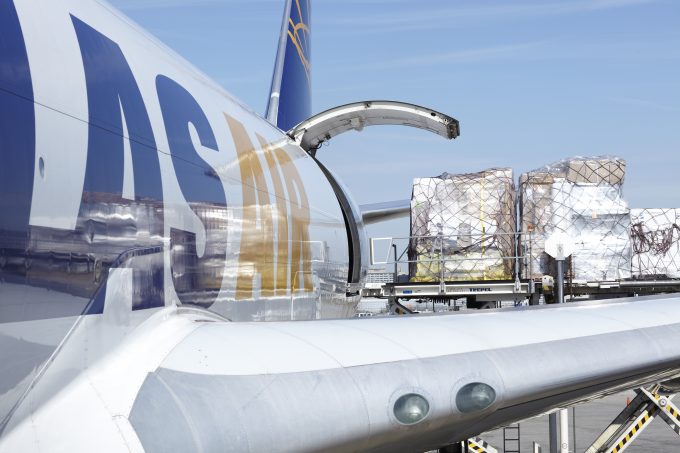Maersk expects profit hike on strong demand and Red Sea crisis
AP Møller-Maersk has raised its full-year earnings guidance amid “strong container market demand”. The Danish ...
GM: RAISING THE ROOF GGM: IN FULL THROTTLE GZIM: MAERSK BOOST KNIN: READ-ACROSSMAERSK: NOT ENOUGHMAERSK: GUIDANCE UPGRADEZIM: ROLLERCOASTERCAT: HEAVY DUTYMAERSK: CATCHING UP PG: DESTOCKING PATTERNSPG: HEALTH CHECKWTC: THE FALLGXO: DEFENSIVE FWRD: RALLYING ON TAKEOVER TALKODFL: STEADY YIELDVW: NEW MODEL NEEDEDWTC: TAKING PROFIT
GM: RAISING THE ROOF GGM: IN FULL THROTTLE GZIM: MAERSK BOOST KNIN: READ-ACROSSMAERSK: NOT ENOUGHMAERSK: GUIDANCE UPGRADEZIM: ROLLERCOASTERCAT: HEAVY DUTYMAERSK: CATCHING UP PG: DESTOCKING PATTERNSPG: HEALTH CHECKWTC: THE FALLGXO: DEFENSIVE FWRD: RALLYING ON TAKEOVER TALKODFL: STEADY YIELDVW: NEW MODEL NEEDEDWTC: TAKING PROFIT

Atlas Air released solid fourth-quarter and annual results today, and showed the lessor continuing to profit from benign trends while investing in new growth initiatives.
The chief reason for the increased profits and revenues was the continuing growth of e-commerce volumes and the strength of Asian economies, according to chairman and chief executive William Flynn.
“Our focus is on express and e-commerce, and fast-growing markets in Asia and elsewhere, such as South America, where we had the strongest year in the company’s history. As airfreight tonnage continues to grow, further globalisation will require time-definite air networks to facilitate the flow of goods.
“We are well-positioned to capitalise on the scale and scope of our domestic and worldwide operations, to drive record volume, revenue, adjusted EBITDA and adjusted net income this year, and to further reduce our net leverage ratio,” he said.
Volumes in the fourth quarter rose 17% to 83,437 block hours, with revenues growing 22% to a record $765m, it said, although reported income from continuing operations, net of taxes, was flat at $211m, or $2.73 per diluted share. For the full year, volumes were similarly up 17% to 296,264 block hours, with revenue growing 24%, hitting a new group record of $2.7bn.
Reported income from continuing operations, net of taxes, was up 21% to $270.6m, or $5.22 per diluted share, although that included an unrealised gain on financial instruments of $123.1m related to outstanding warrants.
On an adjusted basis, it said income from continuing operations, net of taxes, surged 53% to $204.3m, or $7.27 per diluted share, compared with $133.7 million, or $4.93 per diluted share, in 2017. Meanwhile, adjusted ebitda rose 26% to $540.6m.
As at 31 December 31, cash and cash equivalents stood at $248.4m, down from $305.5m one year earlier, due to cash outlays from investing activities, which were only partially offset by operating and financing cash flows.
“Net cash used for investing activities during 2018 primarily related to capital expenditures and payments for flight equipment and modifications, including the acquisition of 777-200 aircraft, 767-300 passenger aircraft and related freighter-conversion costs, spare engines and GEnx engine performance upgrade kits,” it said, adding that net cash provided by financing activities primarily reflected proceeds from “our financings of 777-200 and 767-300 aircraft, partially offset by payments on debt obligations”.
The group expects “continued solid business and earnings growth in 2019” as in addition “to the essential building blocks we have set in place, we will have a full year of flying by the aircraft we added to our fleet in 2018. We also see opportunities to grow with existing customers, such as the incremental flying we will begin to do for Nippon Cargo Airlines, and to add new ones,” it added.
Global economic activity and air freight demand are expected to expand at a moderate pace in 2019, while air freight tonnage continues to grow from record levels.
It predicts volumes up to around 340,000 block hours (“with over 75% in ACMI and the balance in charter”) in 2019, with revenues of about $3bn (~ +11%) and adjusted ebitda of about $600m.
“We also anticipate that our adjusted net income will grow by a mid- to upper-single-digit percentage compared with 2018. We expect our full-year 2019 adjusted income tax rate to be approximately 20%.”
In addition, it expects to fly approximately 75,000 block hours (over 75% in ACMI) in the first quarter of 2019, with revenue of about $680m and adjusted ebitda of about $110m.
“Our first-quarter 2019 outlook includes revenue in our Dry Leasing segment from maintenance payments related to the scheduled return of a 777-200 cargo aircraft, which we expect to receive late in the quarter, partially offset by higher heavy maintenance expense compared with the year-ago first quarter,” it noted.
Aircraft maintenance expenses in 2019 are expected to come in at $420m, higher than in 2018 due to an increase in daily line maintenance, driven by the growth of the fleet and the anticipated growth in block hours. As it happened in 2018, it expects line maintenance to comprise about two-thirds of its total maintenance expenses for the year.
“2018 was another great year for Atlas, with substantial growth in the scale, diversity and profitability of our business,” Mr Flynn said.
“We expect to benefit from a full-year of flying by the aircraft we added in 2018 for customers such as Asiana, DHL Express, Inditex and SF Express. We will see our first year of flying twenty 767-300s for Amazon. We look forward to operating three incremental 747-400 freighters for Nippon Cargo Airlines, which will increase our near-term fleet to 115 aircraft. And we anticipate that the flying we do for the military will be higher than the flying we did in 2018,” he added.
Comment on this article